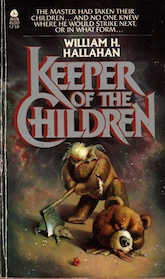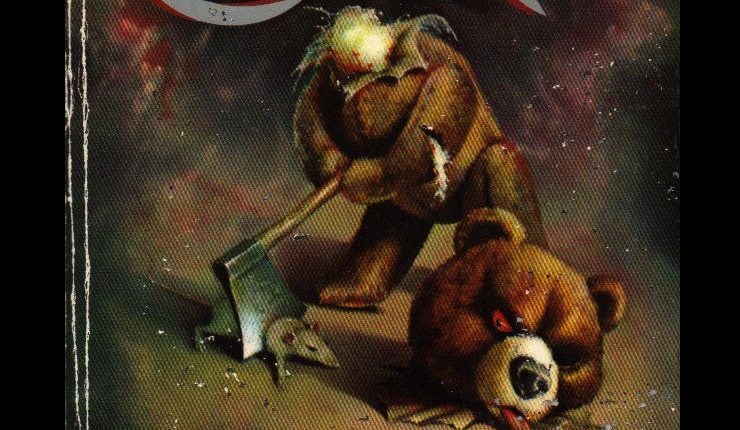Wake up, America! We’ve been complacent for too long. For decades our enemies have been infiltrating our homes, brainwashing our children, and turning us against one another. It’s time we came together as a country and turned our anger on the real enemy. They’ll try to stop us, of course. They’ll try to make us look crazy which won’t be very hard, because even naming this enemy sounds like you’ve put on your tin foil hat and started talking about SPAWAR at a dinner party… but SPAWAR turned out to be true so the joke’s on everyone else!
Who are these devious anti-American termites gnawing away at the foundations of our democracy from deep within the house of liberty? You know who I’m talking about. Our sworn enemies are not the liberals, or the Communists, or the Fascists. The enemy of mankind has been nestled in our arms all along: toys! Tickle Me Elmo? Tickle Me Terrorist! Lego Batman? Let’s Go Overturn Democracy Batman! Don’t even get me started on the Velveteen Rabbit—that lethal lagomorph should be in Gitmo for trying to help his plush army “turn real.” You want “real”? How about a couple of steel-jacketed slugs from my .45, you heinous hare? Is that real enough for you?
It’s with a huge sense of pride that I hail the bravery of author William Hallahan who tries to educate the sheeple of this country about the snuggly terrorist within our toy boxes. Hallahan gave us the chilly reincarnation novel, The Search for Joseph Tully, that mixed details of the 18th century wine trade with the joys of decapitation, and he also demonstrated his patriotic bona fides with The Day the American Revolution Began: 19 April 1775. He also wrote The Monk about a hawk from hell hunting super-children, but nobody’s perfect.
Most readers will open Keeper of the Children and start screaming right away. They may never stop. Maybe it’s Signora Strega, the witch marionette hanging on a playroom wall that comes to life, tears off a banister balustrade and uses it like a baseball bat to kneecap her human opponents. Maybe it’s the teddy bear in the park ranger’s hat with an axe. It could be the doorbell ringing in the middle of the night, the front door opening to reveal a department store mannequin holding a golf club, ready to bash your brains out. It could be any of these things that causes the casual reader to crack and throw this book into the incinerator. After all, it’s not even halfway through the book that Swaggers, the family dog, hurls himself out the second floor window without hesitation, preferring suicide to this cavalcade of toy box terrors.
The terror starts when 14-year-old Renni Benson is late for dinner. As her mother knows, a child who is late for dinner has probably joined a cult and that turns out to be sadly true. When Edward Benson, advertising photographer, returns from assignment in Italy he hears the sad news that his daughter has been kidnapped and turned into a professional panhandler wearing Buddhist robes by “an Oriental or an Indian or something.” There’s a parent’s organization led by Kenneth Custis for mamas and papas whose children have been kidnapped by this ethnically vague foreigner, but first Eddie has to check in with his ad agency where he learns that they’re sending him on a dream gig to shoot a commercial in the Serengeti. Dammit. That only gives him six days to wrap up this kidnapping business because, let’s face it, kids are great and all but this commercial shoot in the Serengeti is “the cat’s ass.”
The concerned parents meeting has barely begun when a super-strong scarecrow shows up and beats Custis to death with a lead pipe, leaving “little broomstick footprints” in its wake. The parents group reassesses. On the pro side, they now know that their enemy is Khiem, a yogi from Tibet who escaped the Chinese by fleeing to Vietnam, and who now runs his child begging squads out of the ironically named House of Peace. On the con side, they can’t get him deported because all the paperwork was destroyed by the scarecrow. The group consists of Eddie, Mr. Garman (who has broken veins on his nose which is shorthand for: he’s a cowardly alcoholic who beats his wife and doesn’t care about his daughter), and Dr. Sing, a Chinese stereotype who’s an electrical engineer and says things like, “As an Oriental dealing with an Oriental I may have some ways of dealing with Khiem.”
In short order, Garman is beaten to death by the golf-loving department store mannequin, and Dr. Sing is eaten by “a band of wild house cats, possibly rabid”. It’s up to Eddie and he’s only got a few days before he has to go to Africa to shoot his ad and, let’s face it, if his daughter’s kidnapping makes him change his work schedule then the kidnappers have won. Turns out that Khiem isn’t your average, everyday foreigner out to destroy America by corrupting its youth. He can stick his soul in just about anything and now he animates the Benson family’s marionette collection. Cue Swaggers’s suicide. At this point, Eddie does cancel his trip to Africa. When there are puppets to be destroyed, no real American doubts where his priorities lie.
Without telling his wife, Eddie disappears for several weeks to learn yoga from Dr. Sanjay Nullatumbi who teaches him Downward Dog, Child’s Pose, and how to send his consciousness into stuffed animals. Eddie lays a trap for Khiem and sees his true form on the astral plain: a big black ball of tar, formless and shapeless. It’s every white man’s nightmare. You could write a thesis about this fear of shapeless black masses in horror fiction, but that would mean you’re a pinko liberal who went to college, so don’t. Eddie doesn’t have time to footnote sources when he has to possess a life-sized clown in his children’s bedroom (shudder) and have it beat the tar out of Khiem’s possessed teddy bear with a baseball bat.
 Khiem flees back to the House of Peace which contains no stuffed animals and is guarded by Siamese attack cats from Tibet who hunt down intruders in packs and eat their faces. At this point, the whole book takes a turn for Watership Down territory and for a few chapters we see the world from the point of view of a stray cat that Eddie ultimately possesses and uses to attack the head of the Siamese attack cat squad. The two cats fight on their hind legs, but while the cat Khiem possesses is powerful and foreign, Eddie’s cat knows street tactics that are new to these cats and he defeats both the foreign cat and the foreign man possessing it, expelling Khiem’s astral body into the outer realm of the universe kind of like at the end of Stephen King’s It.
Khiem flees back to the House of Peace which contains no stuffed animals and is guarded by Siamese attack cats from Tibet who hunt down intruders in packs and eat their faces. At this point, the whole book takes a turn for Watership Down territory and for a few chapters we see the world from the point of view of a stray cat that Eddie ultimately possesses and uses to attack the head of the Siamese attack cat squad. The two cats fight on their hind legs, but while the cat Khiem possesses is powerful and foreign, Eddie’s cat knows street tactics that are new to these cats and he defeats both the foreign cat and the foreign man possessing it, expelling Khiem’s astral body into the outer realm of the universe kind of like at the end of Stephen King’s It.
At one point, when Eddie’s wife sees the carnage wreaked by the puppets she worries that their son might see it. “I don’t want him to see that. He’ll have nightmares for weeks,” she says, speaking for all of us. But while Hallahan warns us about the toys made in Vietnam that are out to destroy us, he also gives us hope. For if we all learn yoga, then we can destroy the insidious, unsleeping menace of the tiny toys.
This article was originally published in February 2017 as part of Freaky Fridays, the best source for your weekly dose of outrage inspired by out-of-print paperbacks from the Seventies and Eighties.
 Grady Hendrix is the author of My Best Friend’s Exorcism, Horrrostör, and, most recently, Paperbacks from Hell, a history of the horror paperback boom of the Seventies and Eighties.
Grady Hendrix is the author of My Best Friend’s Exorcism, Horrrostör, and, most recently, Paperbacks from Hell, a history of the horror paperback boom of the Seventies and Eighties.










